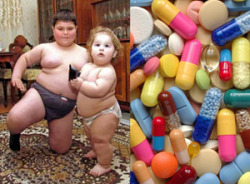The vitamins are organic chemical compound that our body required in certain quantity to perform various functions well and deficiency of them could lead to diseases.
Vitamin deficiency can lead to obesity in children
Vitamin deficiency and Children’s disease
“Children with vitamin D deficiency accumulate fat around the waist and gain weight more rapidly than those who have sufficient vitamin D, more over the `apple shape’ body description of central fat accumulation is commonly associated with a greater risk of Type 2 diabetes, heart disease and other chronic conditions at older ages”, according to a study conducted at University of Michigan. Many such studies have shown the association of various vitamin deficiencies with different diseases.
The vitamins are organic chemical compound that our body required in certain quantity to perform various functions well and deficiency of them could lead to diseases. However, Vitamins can not be synthesized in sufficient quantities in body and must be obtained from outside sources i.e. diet or supplements. Vitamins are of two types’ fat soluble and water soluble.
Vitamins and children’s growth
The vitamins are necessary to maintain a healthy body and mind of a child. They are essential for children’s growth, healthy vision, formation of healthy bones and teeth, immunity against various diseases, wound healing, arresting excessive bleeding etc.
Child who eats balanced diets may get all the necessary vitamins and minerals.
The green leafy vegetables, salads, meats, dairy products, nuts and fruits are all rich source of different vitamins. A healthy diet is an appropriate combination of all, which will give a child sufficient required vitamins.
The recommended dietary allowance of vitamin for children *
| Category | Age | A (mg RE) | D (mg) | E (mg TE) | K (mg) | C (mg) | B5 (mg) |
| Infants | 0 – 1/2 | 375 | 7.5 | 3 | 5 | 30 | 2 |
| Infants | 1/2 – 1 | 375 | 10 | 4 | 10 | 35 | 3 |
| Children | 1 – 3 | 400 | 10 | 6 | 15 | 40 | 3 |
| Children | 4 – 6 | 500 | 10 | 7 | 20 | 45 | 4 |
| Children | 7 – 10 | 700 | 10 | 7 | 30 | 45 | 5 |
Vitamins (Water-Soluble)
| Category | Age | B1 (mg) | B2. (mg) | Niacin (mg NE) | B6 (mg) | Folate (mg) | B12 (mg) |
| Infants | 0 – 0.5 | 0.3 | 0.4 | 5 | 0.3 | 25 | 0.3 |
| Infants | 0.5 – 1 | 0.4 | 0.5 | 6 | 0.6 | 35 | 0.5 |
| Children | 1 – 3 | 0.7 | 0.8 | 9 | 1.0 | 50 | 0.7 |
| Children | 4 – 6 | 0.9 | 1.1 | 12 | 1.1 | 5 | 1.0 |
| Children | 7 -10 | 1.0 | 1.2 | 13 | 1.4 | 100 | 1.4 |
Who requires vitamin supplements?
Preterm infants and children who are exclusively breastfed may also need vitamin supplements. Children, who are picky eaters, may be missing out some of nutrients in their diet and vegetarian children or those with sensitivities to certain foods may need a daily vitamin supplement.
Nowadays the vitamin supplements are available in both liquid and chewable form. They are offered in varied colour and funny shapes so that children would love to have it without any fuss. It is important to note that the overdose of vitamins can be harmful to child.
However, the children’s vitamin supplements should never be considered as a replacement to a healthy diet. Parents must encourage child to eat the required foods and should make nutritious food more attractive and tasty by adopting different recipes.
*http://www.diet-and-health.net/Nutrients/rdas.html




